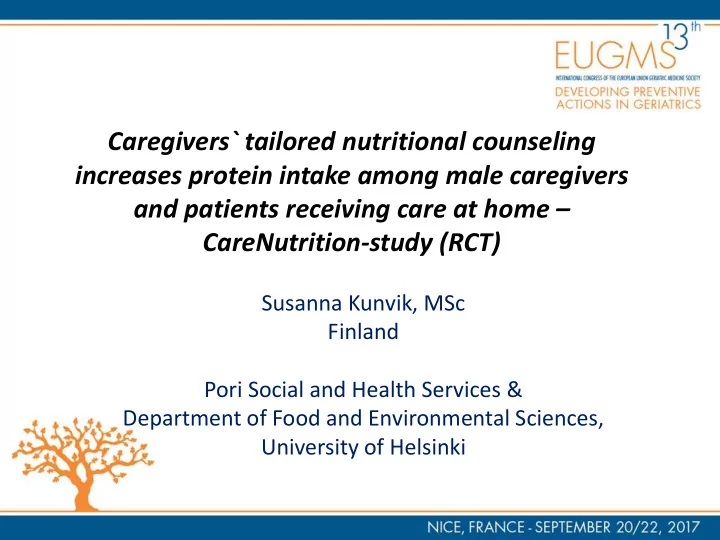

Caregivers` tailored nutritional counseling increases protein intake among male caregivers and patients receiving care at home – CareNutrition-study (RCT) Susanna Kunvik, MSc Finland Pori Social and Health Services & Department of Food and Environmental Sciences, University of Helsinki
CONFLICT OF INTEREST DISCLOSURE I have no potential conflict of interest to report
Introduction • Older caregivers and care recipients are prone to nutritional problems – They often experience high levels of stress, depression, burden and compromised physical health which increase the risk of inadequate nutrition (1,2,3) – Low intake of protein is common and can affect to their nutrition and health (4) 1) Aggarwal B, Liao M, Christian A, Mosca L. Influence of caregiving on lifestyle and psychosocial risk factors among family members of patients hospitalized with cardiovascular disease. J Gen Intern Med. 2009 Jan;24(1):93-8. 2) Rullier, L., Lagarde, A., Bouisson, J., Bergua, V., Torres, M. & Berberger-Gateau, P. 2014. Psychosocial correlates of nutritional status of family caregivers of persons with dementia. International psychogeriatrics/ IPA, vol. 26, no. 1, pp. 105-113. 3) Beeri,M.S., Werner, P., Davidson, M. & Noy, S. 2002. The cost of behavioral and psychological symptoms of dementia (BPSD) in community dwelling Alzheimer`s disease patien`s. Intervantional Journal of Geriatric Psychiatry, vol. 17, no.5, pp.403-408. Puranen, T. 2015. Intervening nutrition among community-dwelling individuals with Alzheimer's disease and their spouses . 4)
Aims and methods • In this study we investigated 1) the effectiveness of tailored nutrition counseling on protein intake among caregivers aged ≥65 years with normal cognition 2) We also investigated if caregivers` nutritional counseling affects to protein intake among care recipients (aged ≥ 50 years) • Sample from CareNutrition randomized controlled trial (RCT) – Study was carried out in the area of Pori Social and Health services in Finland – Study is funded by the Grant of National Institute for Health and Wellfare
Intervention • 6 month intervention to caregivers included – tailored nutritional counseling with home visit – group meetings (2 time cooking course or group conversation 4 times) – written material
Control group • Nutrition booklet about elderly nutrition was offered to control group by mail
Methods • Protein intake was assessed with three-day food diary at baseline and at final measurements • Main outcome measure was change in protein intake (g/kg bodyweight (BW)/d) and it was analyzed among participants with protein intake under 1,2 g/kgBW/d (intervention target) at baseline. – Recommendation 1,2-1,4 g/kgBW/d in Finland
Participants • Total of 55 Caregivers (n=28 I, n=27 C) who completed the study and had protein intake under 1,2 g/kgBW/d at baseline. – 79,7% of all participants, who completed the study – Mean age 73,5 years, 45 % male • Total of 40 Care recipients (n=25 I n=15 C) who completed the study and had protein intake under 1,2 g/kgBW/d at baseline. – 88,8% of all participants, who completed the study – Mean age 75,6 years, 55 % male
RESULTS, CAREGIVERS (n=55): Protein intake increased more in intervention group, but the change between control group was not significant (p=0,26) 0,98 + 0,10 g/kgBW/d 0,96 0,96 0,94 0,92 + 0,04 g/kgBW/d g/kgBW/d 0,9 0,88 0,89 0,86 0,86 0,85 0,84 0,82 0,8 0,78 Baseline Final measurements Intervention Control
RESULTS, MALE CAREGIVERS: Protein intake increased among male caregiver intervention group (n=12) and decreased in control group (n=13), (p=0,007) 1,2 + 0,11 g/kgBW/d 1,0 1 0,89 0,8 g/kgBW/d 0,79 0,72 - 0,07 g/kgBW/d 0,6 0,4 0,2 0 Baseline Final measurements Intervention Control
What does it mean? • Among intervention group male caregivers, protein intake increased from 0,89 to g/kgBW/d to 1,0 g/kgBW/d, even though energy intake did not change (1798 vs. 1782 kcal) • Among persons weighing 70 kg, this means 7,7 g of protein..
RESULTS, CARE RECIPIENTS (n=40): Protein intake increased in care recipient intervention group (p=0,033). Change between intervention and control group was not significant (p=0,48) 0,94 0,92 0,92 + 0,07 g/kgBW/d 0,9 g/kgBW/d 0,88 0,88 0,87 0,86 0,85 - 0,01 g/kgBW/d 0,84 0,82 0,8 Baseline Final measurements Intervention Control
Notifications of results.. • Good changes in the quality of their diet • Milk or meat products were usually added to increase protein intake
Conclusions • Tailored nutritional counseling improve protein intake among elderly male caregivers good and important target to nutrition interventions • Offering nutritional counseling to caregivers affects to care recipient’s nutrition at the same time • More tailored nutrition counseling combined with group meeting are needed
Thank you! Correspondence: Email: susanna.kunvik@pori.fi
Recommend
More recommend